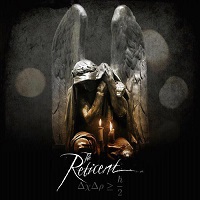The Reticent – Return to the Eve
Thursday, 20th October 2016
In July, The Reticent mainman Chris Hathcock received some surprising news: He was nominated for The Grammy’s Music Educator Award. Hathcock’s day job as a music teacher has brought him in front of dozens of kids, many of whom felt strong enough about his work for them to nominate him. While metal is more than likely not a regular topic of discussion, Hathcock does take the time to discuss theory and how “different modes are featured more prominently in certain styles.” One can see why his students have such a level of appreciation, as Hathcock abides by the simple rule of reminding his students to listen to as much music as they can of all styles. (Hathcock made it to the quarterfinals, but did not make it to the semifinals.)
As for The Reticent, the band was last heard from in 2012 with Le Temps Detruit Tout, a sweeping, expertly composed display of progressive death metal. Hathcock returns with On the Eve of a Goodbye, an emotional concept album about the suicide of Hathcock’s childhood friend, Eve. Musically, the album finds The Reticent exploring new terrain, especially in the vocal department where Hathcock’s convincing cleans turn in some noteworthy performances, in particular, “Funeral for a Firefly.” With that in mind, we grabbed Hathcock for a round of Q’s regarding the new album, and much more. Read on…
Dead Rhetoric: To ask the obvious: Why the four-year delay after Le Temps Detruit Tout?
Hathcock: Well, the gap was not entirely intentional rather it had more to do with my personal life. In the studio, I am The Reticent – I play all the instruments and vocals – so I have to have the time to be certain the material is ready both from a compositional standpoint and a performance one. Right after Le Temps was released, the very next year I accepted a new job in a new state and had to move and adjust to a new life. That was extremely stressful and took a while for me to get acclimated to so the band had to be on hold for a bit. Believe it or not, I had lots of these songs already in the works (some finished) when I was recording Le Temps. My bandmates made a regular joke about the fact that I was two albums ahead in terms of the writing. Although, that wasn’t entirely untrue. Some of the riffs on the new record are almost eleven years old. “Eve’s melody” as I refer to it which pops up all over the place was something I wrote in 2005. As a result of the very personal and revealing nature of the album, I wanted to be absolutely sure about every piece in the puzzle before releasing it. The recording was finished in 2015 and only some very, very minor tweaks (I mean like add some reverb here or there) were done this year but I wanted it to be exactly right.
Dead Rhetoric: It always seemed like you could do a large conceptual piece based on the last album (and Amor Mortem Mei Erit). Was On the Eve of a Goodbye as time-consuming and intensive as you thought it would be?
Hathcock: I think of Le Temps and Amor Mortem as thematic albums rather than concept records because the songs on each record conform to the meaning behind their titles. With Amor Mortem Mei Erit which translates to “Love will be the death of me”, the songs are about loneliness, betrayal, the emptiness that can come from altruism, etc. As such in Le Temps Detruit Tout which translates to “Time destroys everything”, the songs are all related in some way to entropy. Some are more explicit such as Mutually Assured Destruction (the chorus of which is “Nothing’s forever.”) others have to do with the breakdown of relationships (“Lie to Me”) or the human spirit (“Le Tenia”) or hope and faith (“Silence”) or existence itself (“Nihil Ex Nihilo”). But anyway, forgive that long-winded aside.
To answer your question: in some ways, yes and in some ways, no. The recording process was much faster than I or Jamie had anticipated or even booked. For instance we had booked two or maybe three days to record drums and we did them on the first day. This being my first time working with Jamie, he was unfamiliar with my psychotic practice regiment prior to recording (I was practicing probably about three-four hours a day on each instrument leading up to recording). So we were able to knock out a lot of the instrumental portions of the record very quickly. It was the vocals that I underestimated. Not in terms of their demand or needed time, like the instruments most went very quickly. Rather the time we were afforded to allow me to get to (if you’ll pardon the colloquialism) that zone, that place in my mind, forced me to confront certain aspects of Eve’s death that I had not fully accepted or dealt with. So for me, it was a faster process than expected but also a much harder one on my psyche than expected.
Dead Rhetoric: Your clean vocals on a handful of these songs are simply fantastic. Can you describe your development as a clean singer?
Hathcock: I’m afraid I don’t have a whole lot I can say regarding my development as a singer. I’m still rather self-conscious about my voice and feel much more comfortable screaming than I do singing in truth. I started singing clean because I liked the capability of nuance and enjoyed singing itself – though I was never really that good at it. So I sort of developed it out of necessity and through experimentation. However, I do approach singing the way I do any instrument or as I would with any student. I focus on tone, intonation, and shape. Developing tone is simply a matter of air and projection and finding whatever your unique vocal sound is. I developed my sense of intonation and pitch by practicing singing along with all kinds of records. Rather than just singing along for the fun of it, I would be intensely listening to see if my voice is matching the singer’s voice exactly – I’d ask myself if I hear any “waves” in the sound that indicate I am not right on the pitch. Finally, shape for me is the same as giving a speech – certain words or syllables or moments need to have emotional emphasis over others. That is the very thing that gives the music a sense of direction.
Dead Rhetoric: By all accounts, (producer/engineer) Jamie King appears to be a great partner. What’s the relationship like between the two of you?
Hathcock: I loved working with Jamie and have already asked to work with my on my next album (which is another complete concept record). We gelled so well that it felt like we had known each other for years. In fact, as we talked and swapped stories we found out that we ran in almost identical circles and knew so many of the same people prompting Jamie to exclaim, “How have we never hung out?!” He seemed to really appreciate my preparedness and attention to detail and I really appreciated how he gave me so much space to express. He didn’t make a lot of suggestions because, as he said, I did everything the way he would have done it. His encouragement and positivity was absolutely the most vital piece of the puzzle for me though. I’d gotten upset a few times as the subject matter was weighing on me (and even all out broke down once) and he never rushed me or anything. He was receptive and encouraged me to keep putting that into the music. He’d shut off all the lights so I could “vibe out” as he called it and it really made the experience for me. Now that we’ve become friends and know each other’s rhythm, I think our next effort will be all the better.
Dead Rhetoric: Recording something like “Funeral for a Firefly.” Do you hope to never have to go through something like that again?
Hathcock: If I’m honest, yes. For me, that song is the very sound of my heart being ripped open. I wept and sobbed through the entire thing as I was seeing her die again in my mind and then asking these questions that I had been holding in for so many years. The few folks that have heard the record already have sighted that track as a powerful one that seems to affect people. I am really glad about that and I sincerely hope that the song will help someone that is hurting. A part of me wants to record something that was for me as powerful an experience as that but the day before and for days after I barely slept and when I did all I could see was her. It was draining in a way that I hadn’t ever felt before. I thought I would be purged of all this emotion I had long withheld but I ended up having to confront it and deal with it. That I was not prepared for. So it was a while before I began to feel better. Now, I can hope I never feel something like that again but hope has never been much a friend to me. So we’ll see.
Dead Rhetoric: What’s the expectation with a record like this on the live front? Will you attempt to play it all live? Or, pick select songs?
Hathcock: When I take this live, I try to ensure that the club either turns off the lights or only lights us in blue. I have visual media that I cut together of old silent films, current news footage, beautiful images, horrible images, that hopefully will carry the audience through a wide range of thoughts and emotions. Regardless of what songs are played, that is something I strive to be sure is a part of every performance. One thing I think that anyone that’s been to a Reticent show will agree on is that it can be an emotional and intense experience. For instance, we recently played a suicide benefit show for To Write Love On Her Arms and on stage I shared some of my own experience with suicide not the least of which includes the material for this album. As I was talking about and already in that place in my mind from having played, tears began to form small rivers on my cheeks. We then played “The Decision” and “The Day After” from On the Eve Of A Goodbye to close the set and I wept through both of them. So did many in the audience. I share that story because with material like this, I think it loses a sense of authenticity if it is played as rote – like any other song. So we play select songs from this record and Le Temps and tailor to each show. Eventually, I want to do a show where we play the entire album straight through – narrators, horns, and all – but I’m still unable to make it through “Funeral” so that is a small ways off.
Dead Rhetoric: Finally, what’s on your agenda for the rest of 2016?
Hathcock: Well, we just got a new drummer so we are currently bringing him up to speed then we will hopefully get back to doing shows and pushing the record later in the fall and into the winter. Otherwise there is a script ready for a full out video for “The Decision” which will be shooting in December/January which I think is going to be a great representation of the album. Other than that, I’ll be continuing to work on the next record and refining its concept.


























